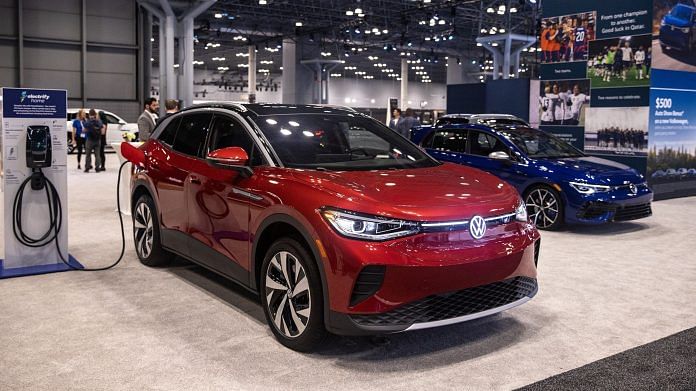New Delhi: Volkswagen AG is looking to sell its first electric car, the ID.4 sports utility vehicle, in India in limited quantities next year as the South Asian nation pushes for faster adoption of cleaner vehicles.
The German carmaker will begin testing the ID.4 around September for its technical capabilities and if any adaptations are needed for local weather conditions, Ashish Gupta, brand director at Volkswagen’s passenger cars division in India, said in an interview Thursday. Once the testing is over, the company will import a limited number of the electric car next year, he said.
Since the Indian government allows automakers to import only 2,500 cars without homologation, Volkswagen will bring its global electric portfolio into the country within that limit to test the market, Gupta said. While it would like to import all 2,500 units, the availability of vehicles is a concern worldwide due to worsening supply chain constraints, he said.
Volkswagen is expecting to start local assembly of its electric cars in India around 2025 or 2027, Gupta said. At that time, the carmaker will consider making its own batteries — the costliest component of an EV — locally in India, he said.
India, the world’s fourth-largest automobile market, is seeing a spurt of interest from global carmakers in the race for green mobility. Volkswagen’s EV will be up against Honda Motor Co.’s first hybrid electric sedan in India, priced at Rs 1.95 million, or about $25,000. Japanese giant Toyota Motor Corp. has agreed to consider adapting its hydrogen-powered fuel cell car, the Mirai, for local road and weather conditions. Kia Corp. is bringing its first electric car to the country later this year, while Hyundai Motor Co. has vowed to roll out six battery models by 2028 and launch its first electric crossover SUV, the Ioniq 5, this year.
Rising commodity prices have had a significant impact on Volkswagen’s margins despite two price hikes to offset inflation, Gupta said. It will raise prices of vehicles further as it doesn’t have the capacity to absorb surging input costs that have increased 10%-12% on an average this year, he said.
For many carmakers, including Volkswagen, Ukraine was a provider of specific components, whose supply has been hit because of the war, Gupta said. Russia and Ukraine are major sources of metals such as nickel, which is used to make high-strength steel for automobiles, he said. Volkswagen is making an effort to increase the capacity of existing suppliers and form alternate supply chains. It’s offering new variants in cars to counter the shortage of infotainment and display systems, he said.
The supply chain constraints and semiconductor shortage will continue for the next six months at least, he said. The supply squeeze has resulted in higher wait times for Volkswagen’s cars. The waiting period for the Taigun small SUV is two months and the backlog is as much as six months for some higher variants, he said.- Bloomberg
Also read: India is crazy about SUVs but Volkswagen still sees Virtus in sedans



